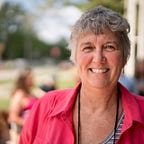Midnight Mass
Jeder Engel ist Schreklich — Rainer Maria Rilke
“Every angel is terrifying.” So writes Rainer Maria Rilke in his Duino Elegies. I loved that line in my 20s, when I was trying to activate things deep in my subconscious, seeking Rilke-esque epiphanies, and trying to make poetry of the stuff.
But at heart, I am a storyteller, a narrative poet, not a lyric one. And the schrekliche Engeln were for me the angels in the sky bringing Good News to shepherds keeping watch over their flocks at night, of whom the shepherds were sorely afraid. At heart, I’ve been shaped by the Christian story. But I’ve also been shaped by American stories, including the one that says we can reinvent ourselves, the one that says we can pull ourselves up by our bootstraps, and the one that says we can escape our families of origin.
And from the culture I picked up other stories, in several genres. Love stories. The Westerns with their insiders and outsiders, their codes, their domestic virtues and put to the test by outlaws. I love those stories.
Also, horror stories. Vampires and Frankenstein’s monster and mummies and zombies. Reading a recent list of classic horror films currently available (for Halloween) on the Criterion Channel, I noted that almost all of them, particularly those starring Boris Karloff and Bela Lugosi, were described as having “sympathetic,” even “tender” portrayals of the monsters. What are monsters if not another version of outcast: a tormented, damaged soul that wreaks havoc and stirs up mobs intent on revenge. Mobs that overlook their own monstrous beings and cling to self-delusion of an inherent purity that must be maintained and can only be maintained by purging society of the monster. I know those stories. Sling Blade is among the best.
But where did the monster come from? Dr. Frankenstein’s hubris that creates life though he is not God. The anthropologist’s hubris that disturbs the ancient burial grounds. The scientist’s hubris that messes around with atomic energy, or a deadly virus, or space, and releases or stumbles upon something monstrous. Satan, the fallen angel, source of all earthly evil, really in the end the hardest to eradicate.
Enter Mike Flanagan and his new series on Netflix, Midnight Mass. A slow-burning horror story that unfolds over more than seven hours. It tells the story of the 132 people living on Crockett Island, cut off from the mainland, a fishing community whose livelihood was ruined by an oil spill and yet, who stay on the island and eke out a living. There’s a new Muslim sheriff on the island, but most of the town is Catholic. There’s a very sinister, insufferable church lady, much despised. There’s a town drunk who accidentally shot a young girl, leaving her paralyzed. And in the first episode two more people arrive, a charismatic young priest and a prodigal son whose own alcoholism resulted in a drunk driving accident that killed a teenager. He has just been released from a four-year jail term for the murder. He is haunted by it. He is not a Christian.
The characters in the series, which I won’t spoil, start swapping stories. Fables, myths, history. Stories about what happens after people die. Horror stories. Miracle stories. Even as a mix of myths, schrekliche Geschichten, start playing out beyond the realms of what is “realistic,” on the island.
Of the genres, horror is really my least favorite. I’m not interested and I’m easily put off by gore or monsters or supernatural evil. There’s a camp to them I don’t appreciate. The sets and cinematography of Midnight Mass have been much praised. I can’t help seeing the camp in the dilapidated homes on the island, but yes they are also beautiful. The blood is so obviously fake, it’s hardly scary. But realism isn’t the point here. Myth and storytelling, supernatural evil and the good people of a small island.
In this age of unbelief, and of True Believers, where I sat down in front of the television to start counting up all the things this show would “get wrong” about Roman Catholicism, because movies and television always get even the rituals of Roman Catholicism wrong, I very quickly didn’t care about any of that. Here was being offered up a foundational myth system that, let’s face it, is pretty terrifying in its way, and it gets combined with some other terrifying myths. Because there’s a text, the Bible, there’s enough to go fully apocalyptic while trying to justify the unjustifiable. Because there’s a very flawed Church here on earth, there’s plenty of hubris, too.
Here is a show about the ways we try, as humans, to cope with suffering that goes unanswered and is so terribly unfair. Here is a story about our hopes and fears and how far we’re willing to go to believe that there’s something out there that can set the world “right,” redeem us, following it all the way to its sometimes horrible end.
And more than any of this, the series is a meditation on a question we humans are always considering: “What is our mortality? And why do we think immortality is better?”
